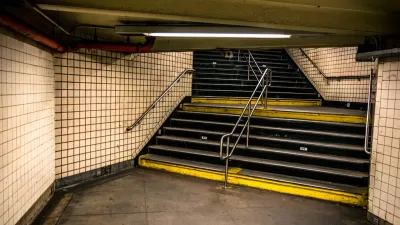The autism community is faced with a housing crisis that could from bad to worse if housing standards end a waiver program that allows group homes for people with intellectual and development disabilities.
Amy S.F. Lutz provides in-depth coverage of an emerging crisis for the autism community around the country. To illustrate the scale of the crisis, Lutz writes:
Right now, 80,000 autistic adults are on waiting lists for residential placements that can be up to 10 years long, and the nonprofit advocacy organization Autism Speaks estimates that half a million autistic children will transition to the adult state-by-state funding system over the next decade.
Despite the current and expected crisis, new federal rules would end a waiver program that allows some states to permit group houses that congregate communities of larger than four individuals. The problem, according to Lutz, is that "[c]ongregate settings for people with intellectual and developmental disabilities (I/DD) have been discouraged for years." The prevailing policies stem from conditions revealed in the 1960s. "It seemed pretty simple: community good, institutions bad. But these two terms have proven extraordinarily difficult to pin down. Is the difference merely one of size?"
Some states are poised to answer the question by adopting standards established by the National Council on Disability in 2011, defining "institutional settings as housing situations in which more than four people with I/DD" live in a single home.
Those standards, however, don’t reflect the kind of community living that benefits individuals with severe autism, which will limit scant housing and treatment options even further.
The article is a long read—complete with anecdotes, historical context, and thought-provoking arguments from the workers and researchers working to provide quality of life improvements for those with autism.
FULL STORY: Who Decides Where Autistic Adults Live?

Alabama: Trump Terminates Settlements for Black Communities Harmed By Raw Sewage
Trump deemed the landmark civil rights agreement “illegal DEI and environmental justice policy.”

Study: Maui’s Plan to Convert Vacation Rentals to Long-Term Housing Could Cause Nearly $1 Billion Economic Loss
The plan would reduce visitor accommodation by 25% resulting in 1,900 jobs lost.

Planetizen Federal Action Tracker
A weekly monitor of how Trump’s orders and actions are impacting planners and planning in America.

Wind Energy on the Rise Despite Federal Policy Reversal
The Trump administration is revoking federal support for renewable energy, but demand for new projects continues unabated.

Passengers Flock to Caltrain After Electrification
The new electric trains are running faster and more reliably, leading to strong ridership growth on the Bay Area rail system.

Texas Churches Rally Behind ‘Yes in God’s Back Yard’ Legislation
Religious leaders want the state to reduce zoning regulations to streamline leasing church-owned land to housing developers.
Urban Design for Planners 1: Software Tools
This six-course series explores essential urban design concepts using open source software and equips planners with the tools they need to participate fully in the urban design process.
Planning for Universal Design
Learn the tools for implementing Universal Design in planning regulations.
Caltrans
Smith Gee Studio
Institute for Housing and Urban Development Studies (IHS)
City of Grandview
Harvard GSD Executive Education
Toledo-Lucas County Plan Commissions
Salt Lake City
NYU Wagner Graduate School of Public Service




























